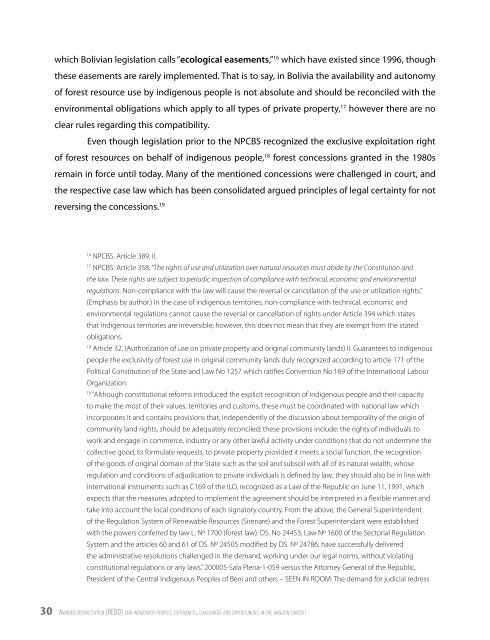Avoided Deforestation (REDD) and Indigenous ... - Amazon Fund
Avoided Deforestation (REDD) and Indigenous ... - Amazon Fund
Avoided Deforestation (REDD) and Indigenous ... - Amazon Fund
You also want an ePaper? Increase the reach of your titles
YUMPU automatically turns print PDFs into web optimized ePapers that Google loves.
which Bolivian legislation calls “ecological easements,” 16 which have existed since 1996, though<br />
these easements are rarely implemented. That is to say, in Bolivia the availability <strong>and</strong> autonomy<br />
of forest resource use by indigenous people is not absolute <strong>and</strong> should be reconciled with the<br />
environmental obligations which apply to all types of private property, 17 however there are no<br />
clear rules regarding this compatibility.<br />
Even though legislation prior to the NPCBS recognized the exclusive exploitation right<br />
of forest resources on behalf of indigenous people, 18 forest concessions granted in the 1980s<br />
remain in force until today. Many of the mentioned concessions were challenged in court, <strong>and</strong><br />
the respective case law which has been consolidated argued principles of legal certainty for not<br />
reversing the concessions. 19<br />
16 NPCBS. Article 389. II.<br />
17 NPCBS. Article 358. “The rights of use <strong>and</strong> utilization over natural resources must abide by the Constitution <strong>and</strong><br />
the law. These rights are subject to periodic inspection of compliance with technical, economic <strong>and</strong> environmental<br />
regulations. Non-compliance with the law will cause the reversal or cancellation of the use or utilization rights.”<br />
(Emphasis by author.) In the case of indigenous territories, non-compliance with technical, economic <strong>and</strong><br />
environmental regulations cannot cause the reversal or cancellation of rights under Article 394 which states<br />
that indigenous territories are irreversible; however, this does not mean that they are exempt from the stated<br />
obligations.<br />
18 Article 32. (Authorization of use on private property <strong>and</strong> original community l<strong>and</strong>s) II. Guarantees to indigenous<br />
people the exclusivity of forest use in original community l<strong>and</strong>s duly recognized according to article 171 of the<br />
Political Constitution of the State <strong>and</strong> Law No 1257 which ratifies Convention No 169 of the International Labour<br />
Organization.<br />
19 “Although constitutional reforms introduced the explicit recognition of indigenous people <strong>and</strong> their capacity<br />
to make the most of their values, territories <strong>and</strong> customs, these must be coordinated with national law which<br />
incorporates it <strong>and</strong> contains provisions that, independently of the discussion about temporality of the origin of<br />
community l<strong>and</strong> rights, should be adequately reconciled; these provisions include: the rights of individuals to<br />
work <strong>and</strong> engage in commerce, industry or any other lawful activity under conditions that do not undermine the<br />
collective good, to formulate requests, to private property provided it meets a social function, the recognition<br />
of the goods of original domain of the State such as the soil <strong>and</strong> subsoil with all of its natural wealth, whose<br />
regulation <strong>and</strong> conditions of adjudication to private individuals is defined by law; they should also be in line with<br />
international instruments such as C169 of the ILO, recognized as a Law of the Republic on June 11, 1991, which<br />
expects that the measures adopted to implement the agreement should be interpreted in a flexible manner <strong>and</strong><br />
take into account the local conditions of each signatory country. From the above, the General Superintendent<br />
of the Regulation System of Renewable Resources (Sirenare) <strong>and</strong> the Forest Superintendant were established<br />
with the powers conferred by law L. Nº 1700 (forest law). DS. No 24453, Law Nº 1600 of the Sectorial Regulation<br />
System <strong>and</strong> the articles 60 <strong>and</strong> 61 of DS. Nº 24505 modified by DS. Nº 24786, have successfully delivered<br />
the administrative resolutions challenged in the dem<strong>and</strong>, working under our legal norms, without violating<br />
constitutional regulations or any laws.” 200005-Sala Plena-1-059 versus the Attorney General of the Republic,<br />
President of the Central <strong>Indigenous</strong> Peoples of Beni <strong>and</strong> others – SEEN IN ROOM: The dem<strong>and</strong> for judicial redress<br />
30 Av o i d e d d e f o re s t A t i o n (redd) A n d i n d i g e n o u s p e o p l e s: experiences, chAllenges A n d o p p o r t u n i t i e s in t h e A m A zo n c o n t e x t
















